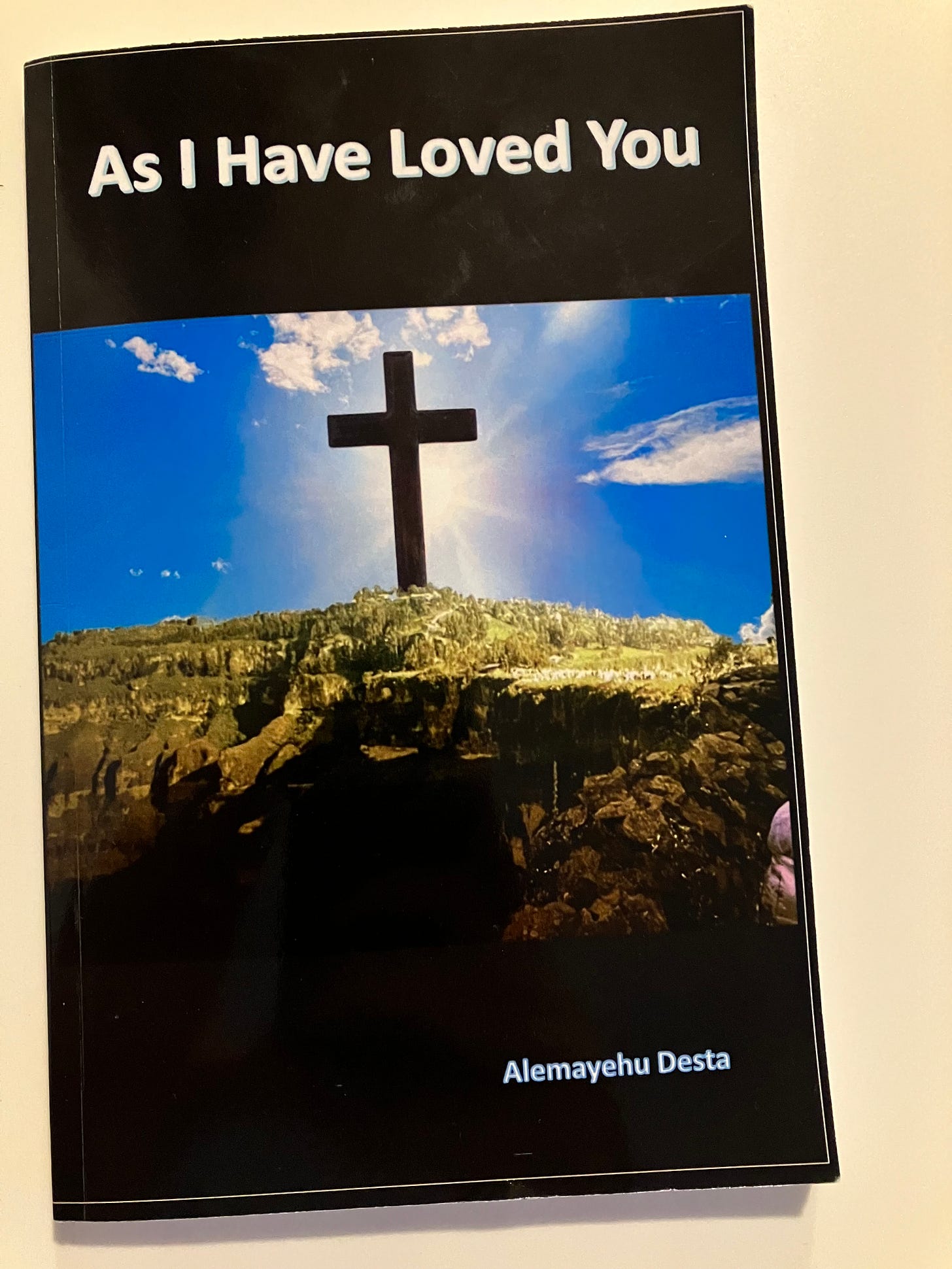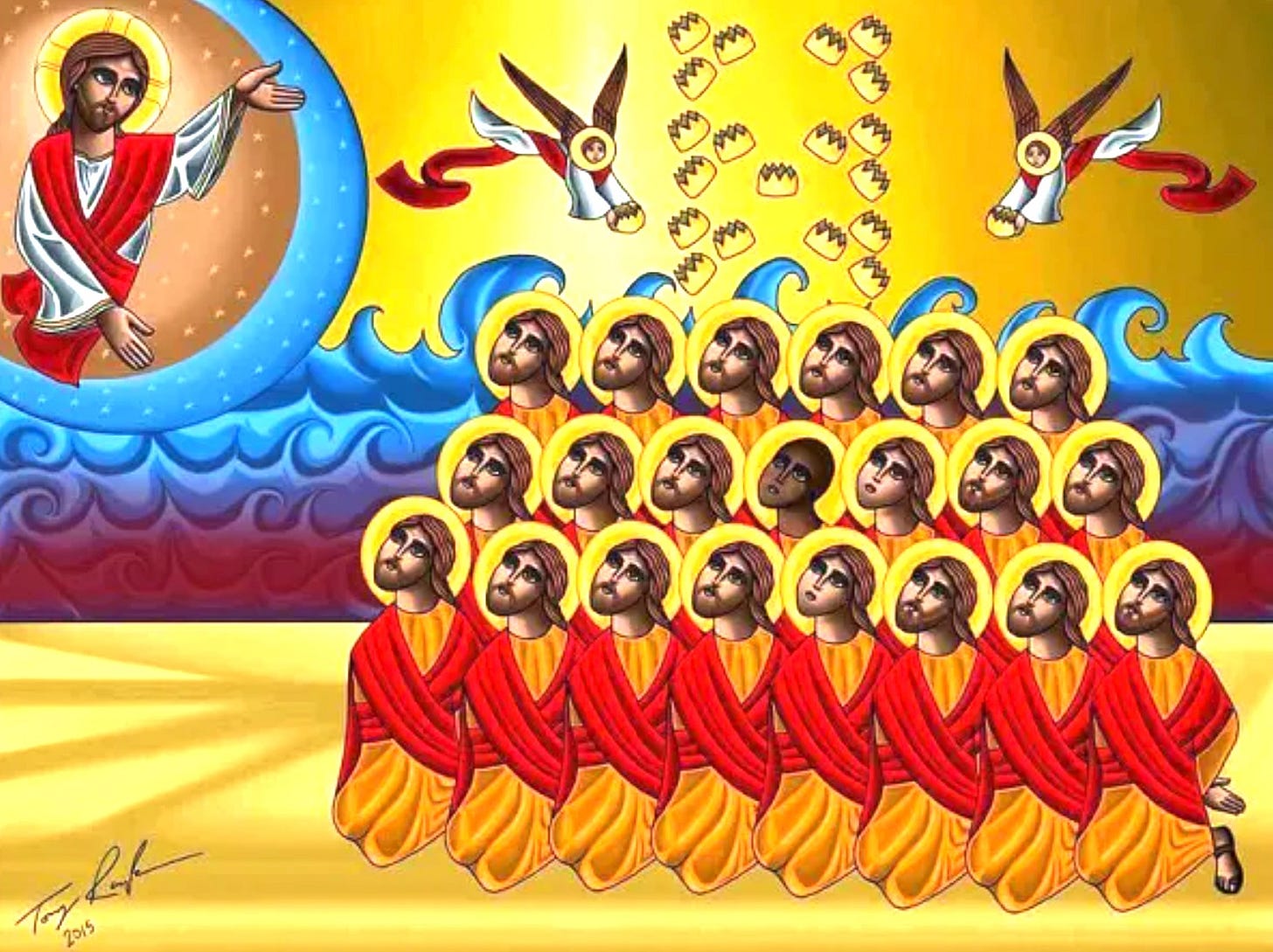Fr. Alemayehu Desta, a servant of Mt. Light Holy Trinity parish in Garland, TX , has gifted the Ethiopian Orthodox Tewahdo Church and her respecters a terse ode (107 pgs.) to the love that God has for those made in His image and His likeness. He opens his book in commemoration of the scores of Ethiopians, Eritreans, and Copts martyred (forced to give witness to Christ with their very necks) in Libya in 2015, at the hands of Daesh (al-dowla al-islaamiyya fii-il-i’raaq wa-ash-shaam). Not theologians. Not preachers. But simple members of the faithful flock.
I have been sharing the images and statements released by the Syriac patriarchy of Antioch and All the East of late, because an adjacent militant Sunni Muslim group has taken over Syria. May the blessing of the prayers of the martyrs of Libya be with us all, and Lordwilling prevent a similar occurence in Syria.
The most tear-inducing part of the two episodes of mass murder in the name of God is when the darker-skinned African, presumed to be of Chad or Ghana but with origins unknown and presumed to be Muslim or Christian but with origins unknown, when asked to deny Christ simply paraphrased Ruth to Naomi (Ruth 1:16) saying, “their God is my God.” And he met the same fate as the rest. Death by sword or gun, on the beach. And more importantly entrance to paradise to receive the doxa stephanos (the glorious crown; 1 peter 5:4).
What is more, because two witnesses are greater than one, Pope Francis said, in conversation with His Holiness Pope Tawadros II of Alexandria, “I am pleased to announce today that, with Your Holiness' consent, these twenty-one martyrs will be included in the Roman Martyrology as a sign of the spiritual communion uniting our two Churches.”
ንግባእኬ:ኀበ:ጥንተ:ነገር (ngbaiké habe Tinte neger; quoted from the Anaphora of the Holy Virgin Mary) let us return to the former matter. There are several places in Fr. Alemayehu’s text where he and his readers would have benefited from an editor; not for substance but for grammar. This is a self-published work by an English as a second language author. For the grammar to be flawless would actually be suspect. I have read such texts, only to later be disappointed when I later hear the author speaking live.
Nevertheless, the substance is the intoxicating and overwhelming love that God has for us through: creation, covenants, crucifixion, resurrection on the third day, ascension on the fortieth day, and the active grace imparted to us through his seven mysteries (sacraments) that we partake in today. The first four of which all are called to partake, and the last three that are only for some to partake in.
Fr. Alemayehu does something novel and ancient at the same time. He leans heavily not on his own understanding, but upon scripture and patristics. And yet the patristics are drawn from the Catena mobile app, which I have enjoyed using for years. They are “a group of Coptic Orthodox Christians” that work “remotely from Cairo, England, Los Angeles, NYC, Toronto, San Francisco, Seattle, Waterloo, & Winnipeg.” This is Afroasiatic archeofuturism at its best. You can even select an on/off switch for three categories of interpreters: Early Fathers, Byzantine Theology, and Western Theology. I usually select Early Fathers.
Here are some delectable examples:
Page 10
“Come you blessed of my father, inherit the kingdom prepared for you before the foundation of the world” (Matthew 25:34)
“He (the Lord Jesus Christ) reveals how great is his bond of love for them (the righteous that will stand on his right when he comes for judgment) and has been from the beginning” (St. John Chrysostom).
Page 19, 20
“Regarding the seventh day, St. Ephrem (the Syrian) says that the seventh day is given to man “to depict by temporal rest … the mystery of the true rest, which will be given to the eternal people in the eternal world.”
Page 70
“if the sepulcher be sealed, there will be no unfair dealing. For there could not be. So, then the proof of His resurrection has become incontrovertible by what you have put forward” (St. John Chrysostom on Matthew 27:63).
Page 76
“He “desired to set Adam free, whose heart was sad and sorrowful, and to bring him back to his former place” (Monday’s Praise of Mary, attributed to St. Ephrem the Syrian in Ge’ez / Classical Ethiopic).
Not all Church Fathers are created equally. These are two of the few I always recommend to catechumens and the long illumined alike. This is because they represent what Christianity is in a genuine and simple fashion. Christianity is a Semitic (specifically Hebrew and Aramaic) way of life in which you glorify God through constant singing and provision for the needier neighbor.
If we are to speak in Greek (or any other tongue), it is with the sharing of this goal in mind. Chrysostom does so in Greek, which is why his homilies have been food for the souls of the many across time and space. Outside of the New Testament, you would be hard-pressed to find more manuscript evidence of anyone other figure. He is the example par excellence of the Antiochene School of Biblical Exegesis (Interpretation). And Ephrem had the advantage of Aramaic being his mother tongue and default mindset. It is natural for Aramaic-speaking Gentiles to receive the faith, of Aramaic-speaking Jews, “which was once for all delivered to the saints” (Jude 3).
You can find Fr. Alemayehu’s book here. I encourage you to read it.




